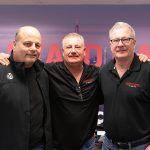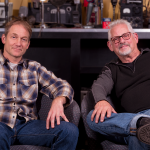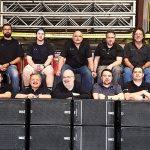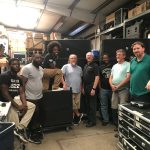Like many, Paradise Show & Design founder Larry Epstein started as a freelancer and built a company. Unlike other entrepreneurial hopefuls starting out a quarter century ago, Epstein and his company is still around. One reason for the company's longevity is its ability to adapt to the changing needs of its customers. Epstein can count the clients Paradise Sound has lost on one hand. And for that, he credits his staff.
"It's hard to find the right people, but we have," Epstein says. While he could string a bunch of freelancers together, he chooses not to. "I used to be a freelance guy, and I know what life is like, booking one gig at a time. My people are full time. They have a 401k. They have health benefits." They can be "focusing on the show in front of them," Epstein adds, because "they aren't worrying about next week."
How Fast Can You Mix?
Epstein hails from Toledo, and went to Ohio University in Athens. He became friends with future director of marketing at JBL, Richard Ruse. Ruse would play in a band called Apriori and approached Epstein about running sound for him. "I think he paid me nothing!" Epstein laughs. (But he did get a longtime associate out of the deal – the drummer for that band, Jerry Jendrzejak, has been with Paradise for 20 years).
Ruse says the band was big, requiring channels for five vocalists, keys, guitars and horns. "We had all the gear we needed, but what we didn't have was a mindful human behind the board that could handle the heat, and that's where Larry comes in," Ruse recalls. "I knew that he possessed a love of music and had all of the human attributes needed to tour with a 10-piece band – he just didn't know anything about gear. I distinctly remember sitting with him in front of an old Sunn board and comparing each channel strip to his home stereo receiver!" But Epstein figured it out quickly, and Ruse confirms that the hiring price was right (i.e., "free").
"Over the course of the next couple of weeks, he picked up on the flow logic and gain structure of the rig and completely embraced the art of mixing. It didn't take long for him to be considered the best soundman in the area."
Epstein later got a break with a company called Sir Products. His audition? "They put me behind a Harrison Alive console, and everything was set flat," he recalls. "A guy comes over with a stopwatch. He says ‘Go,' and the band starts playing – he timed me to see how fast I could get a mix together!" It must have been pretty fast, as he got the gig. But he didn't keep it for too long – he already had other aspirations. He wanted to be his own boss.
But first he would hook up with South Florida's Rockestra, which he describes as one of those many great bands that just didn't make it. During that period, he started buying equipment and renting out small PAs. It was the beginnings of Paradise, though he would do other things like work with his "good friends" and fellow Ohioans at Great Lakes Sound and Lighting.
Air Conditioning!
Then, in 1981, he was meeting his girlfriend in Orlando at the Palace, one of the first convention hotels on the Disney World property. "She's late, and I'm standing around, when I see this tour guy I knew when I was on the road." He calls over to this former Showco guy, they chat a bit, and Epstein follows him into the ballroom.
Cue the dramatic epiphany music.
"I walked into this ballroom and saw all this gear…then he tells me it's all for an IBM convention. I hung out, did the sound check with them, and watched the big named entertainment they had. The biggest impression on me that day was, it was all being done in air conditioning! I said to myself, ‘Man, I gotta do this!'"
Epstein ended up moving to Orlando, where he struggled, picking up a little monitor engineering and installation work. He formulated a business plan that went something like that: He worked at Disney World as long as you absolutely had to as a tech to get that blessed IATSE union card. He then quit the day he was sworn in and started freelancing on an entirely different level. "I worked in film and theater, and it was an eye-opener. Working in these other disciplines totally changed me. I was like, ‘This is how you're supposed to do it.'"
In 1986, he came to the proverbial fork in the road: He could continue picking up good union work as it came, or refocus and make Paradise his career. You can guess which one he chose, though, at the time, it was "a big step to not take any more freelance calls."
A boost in the early days came from being at the right place at the right time: He was doing a live broadcast for the local Star 101 radio station that was broadcasting a New Year's Eve 1988 celebration from Orlando's Peabody Hotel. The hotel's director of entertainment, David Less, came up and said he had a problem: The sound company's main engineer was a no-show.
Epstein stepped in, plugged in the PA and mixed the show that night. Less has never forgotten that. "He then started a new program at the hotel called Sunset Serenade, and hired me to supply sound and lights every Thursday for the next five years. Soon I was getting business from clients using the hotel for meetings and conventions."
As he picked up corporate pro-audio work, inevitably customers started asking him to do lights and video as well. After coming up short bringing in other venders, he realized he needed to do it right. That started with hiring Larry Thomas. "He's a great guy who has helped me immeasurably," he says of Thomas, who is now with Christie Lites. So by the end of 1988, Paradise had expanded their offerings and their client roster. The final piece was scenery: LD Terry Camnitz has taken on that design role.
"Still Very Satisfying"

At this point, Epstein knows all the destinations, all the players, and all the limitations. "My best customers hire us for the big picture," he says. "Our show crew will sit together in our conference room with clients and solve all the potential problems together. Then at load-in, everybody knows exactly what to do and how it's going to work. No surprises! We set records getting our shows in and out."
The corporate world continually turns to Paradise, and the events often include some big-named talent including The Eagles, Barry Manilow, Diana Ross and Huey Lewis, among others. His approach is to bring in systems that seamlessly accommodate both the business meeting and the talent. So if it's been a week of meetings ending with a big performance, by the time they get to the latter, it's just a matter of some minor tweaks.
"It's still very satisfying," he says of Paradise. "I really enjoy my job. My favorite is when customers let us take the ball. We want you happy – because we travel with our best customers to all their destinations, and we want to be on the next gig."
Paradise has also been growing in the installation business. "That's been fun, and it's because we've been really selective with what clients we work with. We only install what we design." He's also launched Launch. "It's a total event planning organization that can help a client plan every detail, from content, message, down to the linens and centerpieces."
Summing up, Ruse calls Epstein a "meticulous problem-solver and a born negotiator, with a wicked sense of humor, who is always looking for a perfect compromise – in other words, a natural businessman."



